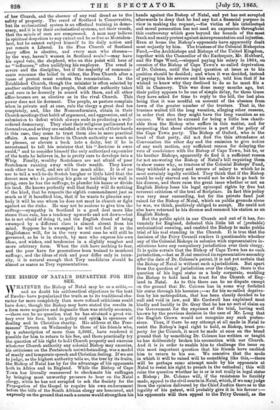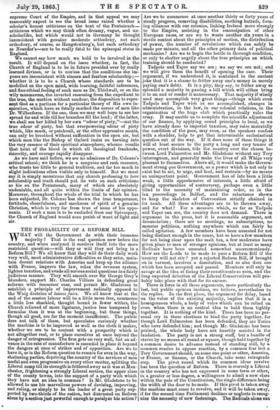THE BISHOP OF NATAL'S DEPARTURE FOR HIS SEE.
WHATEVER the Bishop of Natal may be as a critic,— and no doubt his arithmetical objections to the text of Exodus have popularized the truth as to its traditional cha- racter far more completely than more refined criticisms could have done, though the Bishop may have stated the results in a form more negative and dogmatic than was strictly accurate, —there can be no question that he has attained a great vic- tory over his foes, both in policy and spirit, in openness of dealing and in Christian charity. His address at the Free- masons' Tavern on Wednesday to those of his friends who, by a subscription of more than 3,3001., have rendered it possible for him to return to his See, and there practically try the question of his right to hold Church property and exercise whatever Church authority any colonial Bishop may exercise, his criticisms on the Pentateuch notwithstanding, was a model of manly and temperate speech and Christian feeling. If we are to judge, as the highest authority tells us, the tree by its fruits, the Bishop of Natal has by far the advantage of his opponents both in Africa and in England. While the Bishop of Cape Town has literally manceurred to checkmate his suffragan by bringing most unworthy pressure to bear on the Natal clergy, while he has not scrupled to ask the Society for the Propagation of the Gospel to require his own endorsement before the bills of the South African clergy are honoured, and expressly on the ground that such a course would strengthen his hands against the Bishop of Natal, and yet has not scrupled afterwards to deny that he had any but a financial purpose in view in making the request,—the victim of his intellectual and moral persecution has not used an expression throughout this controversy which goes beyond the bounds of the most frank and manly protest against misrepresentation and injustice. Even at home the Bishop's opponents have apparently dealt most unjustly by him. The trustees of the Colonial Bishoprics* Fund,—the Archbishops and Bishops of the -United Kingdom, together with the Chancellor of the Exchequer, Mr. Hubbard, and Sir Page Wood,—stopped paying his salary in 1864, on occasion of the Bishop of Cape Town's so-called deprivation of Dr. Colenso, until the legal question at issue as to his position should be decided; and when it was decided, instead of paying him his arrears and his salary, told him that if he wished to know why they declined to do so ho must file a bill in Chancery. This was done many months ago, but their policy appears to be one of simple delay, for three times- they have asked for time to reply to the bill, the last plea being that it was needful on account of the absence from town of the greater number of the trustees. That is, the- trustees waited till the long vacation, alleging other reasons, in order that then they might have the long vacation as an excuse. We must be excused for being a little less charit- able than the Bishop who suffers in this matter, and for suspecting that sheer obstruction is a part of the policy of the Cape Town party. The Bishop of Oxford, who is the head of that party, did not find the thin attendance at Convocation the other day and the omission to give notice of any such motion, any sufficient reason for delaying the- vote of condolence with the Bishop of Cape Town, but he, or his brother Bishops, apparently do find it a sufficient reason for not answering the Bishop of NataPs bill requiring them_ to show cause why, as trustees of the Colonial Bishops' Fund, they withhold a salary and arrears of salary to which he is- most certainly legally entitled. They think that if the Bishop could be only starved out he would not be able to go back to- his diocese, and there raise the great issue whether or not an English Bishop loses his legal episcopal rights by free but reverent criticism of the text of Scripture. In fact this policy was very near succeeding, but for the private fund just raised for the Bishop of Natal, which on public grounds alone he was, we think, positively obliged to accept. He could not else have returned to his diocese and resumed his station as an. English Bishop.
But the public spirit in our Church and out of it has, for- tunately for England, defeated this little bit of (probable) ecclesiastical cunning, and enabled the Bishop to make public trial of his real standing in the Church. It is true that the decision of the Privy Council renders it questionable whether- any of the Colonial Bishops in colonies with representative in- stitutions have any compulsory jurisdiction over their clergy. It is quite certain that the Bishop of Cape Town has no such jurisdiction,—but as Natal received its representative assembly after the date of Dr. Colenso's patent, it is not yet certain that the Bishop of Natal is without such a jurisdiction. But apart from the question of jurisdiction over the clergy, there is the question of his legal status as a body corporate, enabling the Bishop to hold land in trust for the Church of Eng- land in Natal. As to this there can be no dispute except on the ground that Dr. Colenso has in some way forfeited, his status through his heresies ;—as for his so-called deprivetion by his metropolitan, that has been clearly decided to be null and void in law, and Mr. Cardwell has explained most kindly and lucidly to Dr. Gray that he has no sort of claim on the Government for the expenses of the trial, having well known by the previous decision in the case of Mr. Long that the English Crown would not recognize any such preten- sions. Thus, if there be any attempt at all made in Natal to. resist the Bishop's legal right to hold, as Bishop, trust pro- perty for the Church, it must be made at once on the broad ground that by something Dr. Colenso has written or taught he has deliberately broken his connection with our Church. And it is in order to enable him to challenge the issue on this most important question that his friends have enabled him to return to his see. We conceive that the mode in which it will be raised will be something like this,—there will be perhaps some attempt made by his opponents at Natal to resist his right to preach in the cathedral ; this will raise the question whether he is or is not really in legal status a Bishop ; Dr. Colenso will, if the resistance be forcibly made, appeal to the civil courts in Natal, which, if we may j udge from the opinion delivered by the Chief Justice there as to the- legality of his patent, will probably give it in his favour :— his opponents will then appeal to the Privy Council, as the- supreme Court of the Empire, and in that appeal we may reasonably expect to see the broad issue raised whether a scholar's honest criticisms on the text of the Pentateuch— criticisms which we may think often dreamy, vague, and un- scholarlike, but which would not in Germany be thought inconsistent with genuine moderate orthodoxy, not such orthodoxy, of course, asHengstenberg's but such orthodoxy as Neander's—are to be really fatal to ihe episcopal status in England.
We cannot say how much we hold to be involved in the result. It will depend on the issue whether, in fact, the Church of England is to be in future presided over by really learned divines, or is to confess that the conditions she im- poses are inconsistent with sincere and fearless scholarship ;— whether it is to be a Church whose standards are to be modelled on the open mind, wide learning, faithful inferences, and fine ethical feeling of such men as Dr. Thirlwall, or on the wily manceuvres, the inverted reasoning from the expedient to the true, the unction without candour, the disposition to repro- neat God as a partizan for a particular theory of His own in- spiration which have se fatally marked the career of men like Dr. Wilberforce. If the one, then we may well hope to see her spread far and wide till her branches fill the land; if the latter, we shall see her killed by her own "odour of piety,"—not the true odour of piety, but that overpowering odour of piety which, like musk, or patchouli, or the other oppressive scents, can only be breathed without suffocation in the open air, but which men like the Bishop of Oxford insist on turning into the very essence of their spiritual atmosphere, whence results that taint of the blood in which all theological franknelis, sincerity, and courage rapidly disappear.
As we have said before we are no admirers of Dr. Colenso's oritical school; we think lie is a sanguine and rash reasoner, who trusts too little to general tradition, and far too much to slight indications often visible only to himself. But we must say it is simply monstrous that any church professing to love scholarship and truth should put its veto on such criticisms as his on the Pentateuch, many of which are absolutely undeniable, and all quite within the limits of fair opinion. Moreover, throughout the whole of the trial to which he has been subjected, Dr. Coleus() 'has shown the true temperance, fortitude, cheerfulness, and meekness of spirit of a genuine Christian, which is very far from true of some of his oppo- nents. If such a man is to be excluded from our Episcopacy, the Church of England would soon perish of want of light and air.































 Previous page
Previous page